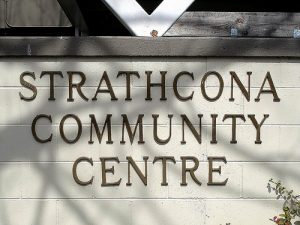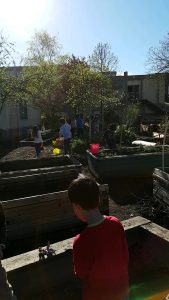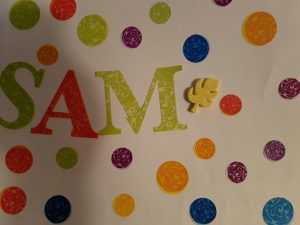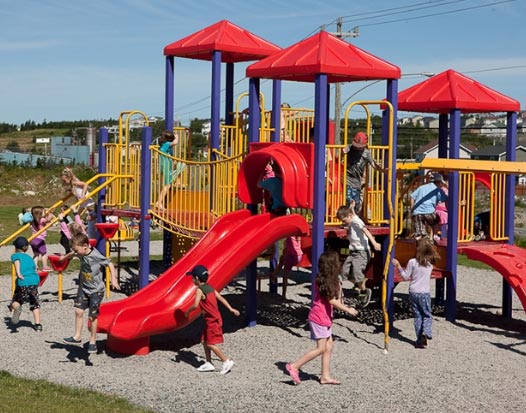
Source: http://www.miss604.com/2009/12/strathcona-community-centre-the-heart-of-the-city.html
My Placement
I volunteered at the Strathcona Community Centre, which is connected to the Lord Strathcona Elementary School. Located in the Downtown Eastside of Vancouver, this community centre offers a fitness centre, preschool classes, programs for children, young adults, and seniors, as well as food security programs for the local population. Specifically, I volunteered with the Afterschool Adventures Program (ASA Program), which provides afterschool child care for students attending the elementary school. Essentially, I spent the afternoon engaging the children with various indoor and outdoor activities. I arrived at 3pm in the afternoon, at which time I helped the staff provide snacks to the children, and remained until 6pm, at which time I was exhausted yet happy having played various games with the children for the duration of the program. Although I had volunteered with children before, this experience was different because I was able to apply sociological concepts to my placement, compelling me to critically examine the factors that influence the success of the program, and the experiences that affect the individuals participating within the program. As well, Trek provided an opportunity for me to give back to the community. The families participating in the ASA Program are generally from low socioeconomic backgrounds, and they are especially in need of services that neoliberal policies have eliminated from the welfare state. Many of the children are enrolled in a program that provides their families with fresh fruits and vegetables every day. Considering all these benefits of participating in Trek, I would highly recommend signing up for the program.
What You Learn

On sunny days, the children like to do some gardening in the community garden!
As I had previously stated, the Trek program provides various opportunities for a student to further their comprehension of topics discussed within lectures and readings. For example, in class we discussed different parenting styles identified and explored by sociologist Annette Lareau in her book Unequal Childhoods: Class, Race, and Family Life. Lareau examines how child rearing practises employed by parents reflect the family’s social class and ultimately affects a child’s opportunities in acquiring economic and cultural capital in the future. Concerted cultivation is Lareau’s term to describe a parenting technique (prevalent in upper and middle class families) that relies on organized activities to help children develop a sense of entitlement with regards to societal institutions. This sense of entitlement provides children with the confidence to challenge authority figures and pursue their personal interests. Natural growth is Lareau’s term to describe a parenting technique (prevalent in working and lower class families) characterized by the belief that children will blossom naturally. Consequently, in natural growth, a parent’s role is merely to provide the essential resources for this blossoming to occur. Parents who employ this method of child rearing rely on the child to occupy themselves with unstructured play and tend to emphasize the hierarchical nature of parent-child relationships so children view themselves as subordinate to authority figures. After learning about these concepts in class, I could notice differences between the children who attended the ASA Program and those I grew up with in my elementary school. The Downtownside Eastside is a lower income neighbourhood within Vancouver, notorious for poverty, crime, and drug addiction. The children within the ASA Program are vulnerable with many of them experiencing food insecurity and unstable home environments. My elementary school was located in a middle/upper class neighbourhood where children were fortunate to experience the benefits of their parents’ wealth and high level education. Children attending the ASA Program likely grew up under the influences of natural growth, while children in my elementary school likely grew up under the influences of concerted cultivation. Upon acquiring this knowledge, I began to recognize differences between the children of the ASA program and my elementary school. For example, a parent picking up their child from the ASA Program might answer to a child’s inquiry as to why they had to leave with a “because I said so.” These children presumed a subordinate role within their relationships with supervisors in the program. When Julie, one of the program leaders requested something from a child, the child never questioned it. This was usually not the case in my elementary school, where the fact that parents often fought for their children’s interests meant that children developed a sense of entitlement to the right to engage with authority figures in meaningful ways.

Sometimes the children will give you their artwork and it really warms your heart!
Concerted cultivation and natural growth are only two concepts discussed in class and just one example of how sociology has helped me to see things that I would never have noticed before. It is very interesting having a new lens through which to see the world, and Trek allows you to practise using this lens to draw important conclusions about the world we inhabit.
Benefits and Drawbacks
Trek is a wonderful opportunity to build a network. Not only is it rewarding to volunteer, but it is a way to explore potential job opportunities that you may not have realized would interest you. The children are so enjoyable to be around, and often, Trek is a wonderful opportunity for me to relax, take a break from my academic life, and be a kid again. It is rewarding to see that you are making a small difference within a child’s life, either by playing a game with them or lending an ear to their never-ending stories.
If you do join Trek, you do not have to write the term paper that you would have to write it if you were in a regular discussion session. The only downfall of this, I found, was that I may have lost an opportunity to learn more about how to conduct sociological research, as well as how to write a sociology paper in general. There was likely exam preparation within regular discussion sessions that would have been helpful to access that Trek students missed. In the long run, however, Trek allows you to apply the concepts you learn in class to real situations, compelling you to think critically of the factors influencing the situation in which you have been placed, and allows you to give back to the community.
Works Cited:
Lareau, Annette. Unequal Childhoods: Class, Race, and Family Life. Berkeley: University of California Press, 2003. Print.
